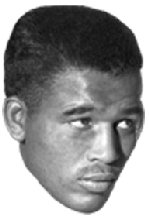





















Sugar
Ray Robinson (born Walker Smith Jr.; May 3, 1921 - April 12, 1989)
was an American professional boxer. Frequently cited as the greatest
boxer of all time, Robinson's performances in the welterweight and
middleweight divisions prompted sportswriters to create "pound-for-pound"
rankings, where they compared fighters regardless of weight. He was
inducted into the International Boxing Hall of Fame in 1990.
Robinson
was 85-0 as an amateur with 69 of those victories coming by way of
knockout, 40 in the first round. He turned professional in 1940 at
the age of 19 and by 1951 ha a professional record of 128-1-2 with
84 knockouts. From 1943 to 1951 Robinson went on a 91 fight unbeaten
streak, the third longest in professional boxing history. Robinson
held the world welterweight title from 1946 ot 1951, and won the world
middleweight title in the latter year. He retired in 1952, only to
come back two and a half years later and regain the middleweight title
in 1955. He then became the first boxer in history to win a divisional
world championship five times, a feat he accomplished by defeating
Carmen Basilio in 1958 to regain the middleweight championship. Robinson
was named "fighter of the year" twice: first for his performances
in 1942, then nine years and over 90 fights later, for his efforts
in 1951.
Renowned for his flamboyant lifestyle outside the ring,
Robinson is credited with being the originator of the modern sports
"entourage". After his boxing career ended, Robinson attempted a career
as an entertainer, but it was not successful, and he struggled financially
until his death in 1989. In 2006, he was featured on a commemorative
stamp by the United States Postal service.
Early life
Robinson
was born Walker Smith Jr. in Alley, Georgia (according to the Sugar
Ray Robinson Official Site), to Walker Smith Sr. and Leila Hurst.
Robinson was the youngest of three children; his older sister Marie
was born in 1917 and his older sister Evelyn was born in 1919. His
father was a cotton, peanut, and corn farmer in Georgia, who moved
the family to Detroit where he initially found work in construction.
According to Robinson, Smith Sr. later worked two jobs to support
his family, cement mixer and sewer worker. "He had to get up at six
in the morning and he'd get home close to midnight. Six days a week.
The only day I really saw him was Sunday, I always wanted to be with
him more."
His parents separated and he moved with his mother
to the New York City neighborhood of Harlem at the age of twelve.
Robinson originally aspired to be a doctor, but after dropping out
of De Witt Clinton High school in ninth grade he switched his goal
to boxing. When he was 15, he attempted to enter his first boxing
tournament but was told he needed to first obtain an AAU membership
card. However, he could not procure one until he was eighteen years
old. He received his name when he circumvented the AAU's age restriction
by borrowing a birth certificate from his friend Ray Robinson. Subsequently
told that he was "sweet as sugar" by a lady in the audience at a fight
in Watertown, New York, Smith Jr. became known as "Sugar" Ray Robinson.
Robinson idolized Henry Armstrong and Joe Louis as a youth,
and actually lived on the same block as Louis in Detroit when Robinson
was 11 and Louis was 17. Outside the ring, Robinson got into trouble
frequently as a youth, and was involved with a violent street gang.
He married at 16. The couple had one son, Ronnie, and divorced when
Robinson was 19. He finished his amateur career with an 85-0 record
with 69 knockouts, 40 coming in the first round. He won the Golden
Gloves featherweight championship in 1939, and the organization's
lightweight championship in 1940.
Boxing career
Early career
Robinson
made his professional debut on October 4, 1940, winning via second
round knockout over Joe Echevarria. Robinson fought five more times
in 1940, winning each time, with four wins coming by way of knockout.
In 1941, he defeated world champion Sammy Angott, future champion
Marty servo and former champion Fritzie Zivic. The Robinxon-Angott
fight was held above the lightweight limit, since Angott did not want
to risk losing his lightweight title.






